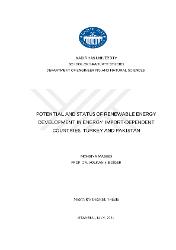| dc.contributor.advisor | Ediger, Şevket Volkan | en_US |
| dc.contributor.advisor | Kirkil, Gökhan | en_US |
| dc.contributor.author | Majeed, Mohsina | |
| dc.date.accessioned | 2022-03-23T13:27:55Z | |
| dc.date.available | 2022-03-23T13:27:55Z | |
| dc.date.issued | 2021 | |
| dc.identifier.uri | https://hdl.handle.net/20.500.12469/4289 | |
| dc.description.abstract | Human life cannot be imagined without the use of energy. Demand for energy, meanwhile, is increasing daily across the globe, while the uses and sources of energy have changed over time. Fossil fuels have dominated other energy sources since the 19th century but began causing problems such as climate change. In order to address these problems, renewable energy sources (RES) were accepted as an alternative energy sources in recent years and technical and economic developments make possible the energy transition from fossil fuels to renewables at an accelerated rate. Turkey and Pakistan are both developing countries with large populations and high levels of energy-import dependency, 77% and 80%, respectively. At the same time, Turkey and Pakistan both have enormous potential for RE such as solar, wind, hydro, biomass and geothermal, according to the validated RE-potential maps of these countries. Turkey and Pakistan are realizing renewable energy transition and seeking to shape their current energy structure in the favor of RES. The factors affecting RED in Turkey and Pakistan are enormous RE potential, supportive RE policies by government and energy security issues. There are some political, economic, technical and social problems for RED in Turkey and Pakistan that include lack of proper RE policies, extended and time-consuming governmental procedures, the lack of domestic production of goods, and other financing problems for RE projects. If proper policy support and efficient investment become available, RES can provide enough power to fulfill the country's energy demand and bring prosperity and sustainability to both countries. Current RED in these countries is not sufficient for complete energy transition from fossil fuels to renewables. However, RE potential in these countries is enough for complete energy transition. According to SWOT analysis Pakistan's RE sector has various investment opportunities for Turkish investors. It has a validated RE source mapping system and untapped highly potential solar and windy areas. Mini-hydro plants is also a successful RE business model in Pakistan. The government of Pakistan is also offering various incentives for RE investors. Keywords: Renewable energy transition, sustainability, solar, wind, fossil fuel | en_US |
| dc.description.abstract | Enerji kullanılmadan insan hayatı düşünülemez. Bu arada, enerji kullanımı ve kaynakları zaman içinde değişirken, enerji talebi dünya genelinde her gün artıyor. Fosil yakıtlar 19. yüzyıldan itibaren diğer enerji kaynaklarına egemen olmuş ancak iklim değişikliği gibi sorunlara neden olmaya başlamıştır. Bu sorunları gidermek için yenilenebilir enerji kaynakları (YEK) son yıllarda alternatif bir enerji kaynağı olarak kabul edilmiş ve teknik ve ekonomik gelişmeler fosil yakıtlardan yenilenebilir enerjiye hızlı bir şekilde geçişi mümkün kılmıştır. Türkiye ve Pakistan, sırasıyla %77 ve %80 ile yüksek nüfusa ve yüksek düzeyde enerji ithalatı bağımlılığına sahip gelişmekte olan ülkelerdir. Aynı zamanda, bu ülkelerin onaylanmış RE-potansiyel haritalarına göre, hem Türkiye hem de Pakistan güneş, rüzgar, hidro, biyokütle ve jeotermal gibi yenilenebilir enerji için muazzam bir potansiyele sahiptir. Türkiye ve Pakistan, yenilenebilir enerji geçişini gerçekleştirmekte ve mevcut enerji yapılarını YEK lehine şekillendirmeye çalışmaktadır. Türkiye ve Pakistan'da RED'i etkileyen faktörler, muazzam YE potansiyeli, hükümetin destekleyici YE politikaları ve enerji güvenliği konularıdır. Türkiye ve Pakistan'da RED için uygun YE politikalarının olmaması, uzun ve zaman alıcı hükümet prosedürleri, yerli mal üretiminin olmaması ve YE projeleri için diğer finansman sorunları gibi bazı siyasi, ekonomik, teknik ve sosyal sorunlar bulunmaktadır. Bu ülkelerdeki mevcut RED, fosil yakıtlardan yenilenebilir kaynaklara tam bir enerji geçişi için yeterli değildir. Ancak bu ülkelerdeki yenilenebilir enerji potansiyeli, tam bir enerji geçişi için yeterlidir. SWOT analizine göre Pakistan'ın YE sektörü Türk yatırımcılar için çeşitli yatırım fırsatlarına sahip. Doğrulanmış bir RE kaynak haritalama sistemine ve kullanılmayan yüksek potansiyelli güneş ve rüzgarlı alanlara sahiptir. Mini hidroelektrik santraller de Pakistan'da başarılı bir YE iş modelidir. Pakistan hükümeti de yenilenebilir enerji yatırımcıları için çeşitli teşvikler sunuyor. Anahtar Kelimler: Yenilenebilir enerjiye geçiş, sürdürülebilirlik, güneş, rüzgar, iklim,değişikliği, fosil | en_US] |
| dc.language.iso | eng | en_US |
| dc.publisher | Kadir Has Üniversitesi | en_US |
| dc.rights | info:eu-repo/semantics/openAccess | en_US |
| dc.subject | Enerji | en_US |
| dc.subject | Energy | en_US |
| dc.title | Potential and status of renewable energy development in energy import-dependent countries Turkey and Pakistan | en_US |
| dc.title.alternative | Enerji ithalatına bağımlı ülkeler Türkiye ve Pakistan'da yenilenebilir enerji geliştirme potansiyeli ve durumu | en_US |
| dc.type | masterThesis | en_US |
| dc.department | Enstitüler, Lisansüstü Eğitim Enstitüsü, Mühendislik ve Doğa Bilimleri Ana Bilim Dalı | en_US |
| dc.institutionauthor | Majeed, Mohsina | en_US |
| dc.relation.publicationcategory | Tez | en_US |
| dc.identifier.yoktezid | 699179 | en_US |
















